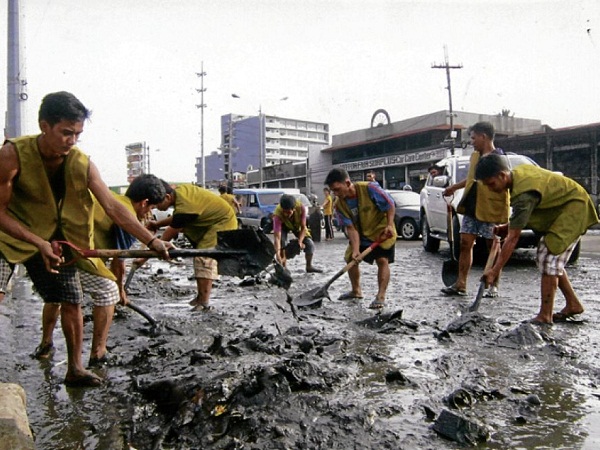
DIGNITY OF WORK Flood victims earn quick cash—and the praise of many—cleaning up their own streets and schools. CONTRIBUTED PHOTO
Forty-three-year-old Bong Morandarte, whose shoemaking business was washed away by the recent floods, walked along the muddy streets of Marikina City, his heavy shovel in hand.
“It’s hard, but that’s the way it is,” said Morandarte, his face still wet from the rain, after doing his share in cleaning up some of the affected classrooms in Nangka High School.
His friend, Jaime Nicol Jr., 59, moved about in rubber boots on the wet pavement strewn with leaves, pieces of plywood and other remnants of the calamity.
“We have to return to the school and clean again after taking a rest. We need the money,” said Nicol, who was then unemployed.
Floodwaters in Marikina had almost completely subsided as of late last week, but local officials were still left with the daunting task of clearing the streets of mud and debris.
To ensure enough manpower, the city government and the Buddhist charity organization Tzu Chi Foundation tapped about a thousand affected residents like Morandarte and Nicol for the job.
Each resident was paid P400 a day for participating in the five-day cleanup operations under Tzu Chi’s cash-for-work program. The money came from the foundation’s charity funds raised by its members, mostly businessmen.
The daily pay could go a long way in helping the calamity victims to get back on their feet. Morandarte, a father of seven, said he could use the money for his kids’ school allowance.
The foundation launched a similar project in the aftermath of Tropical Storm “Ondoy” in 2009. It mobilized hundreds of volunteers for cleanup operations in the worst-hit communities including Marikina.
According to coordinator Kalam Chan, village officials who were then approached for the cleanup recommended a payment of P100 to P150 per worker, but Tzu Chi’s Taiwan-based founder, Master Cheng Yen, raised the amount to P400.
At that time, the minimum wage in Metro Manila was P382, Chan noted. After an information campaign on the project, “the volunteers just kept coming in,” Chan said.
This year, the cleanup began on Aug. 10 in Marikina, particularly in the villages of Nangka, Malanday and Tumana. On its last day, at least 230 workers turned up in Nangka alone.
One can see the Filipino’s bayanihan spirit shining especially during these difficult times, Chan said. “You see it when they get together and clean other people’s houses.”
Morandarte agreed: “The money helps (as an incentive). But I think when we all help each other, that’s the more important thing.”